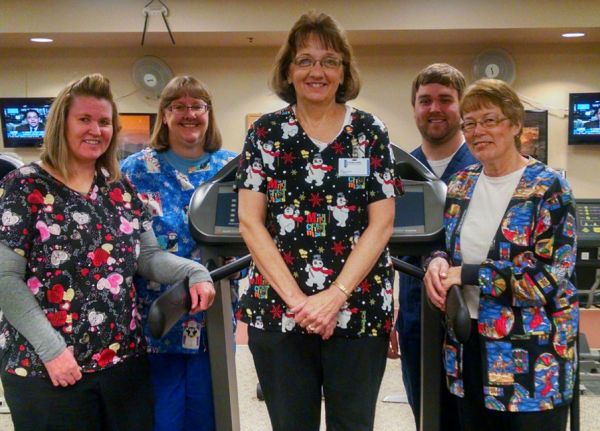We celebrate Pulmonary Rehab week March 8 – 14, 2015 by honoring both the patients who participate in our program and the healthcare professionals who support, educate, and guide them every day. Do you or someone you know have a chronic lung disease? Learn about Pulmonary Rehab and if it's right fit with this Q& A with Bobbie Bach.
Q: What is pulmonary rehabilitation?
A: Pulmonary rehabilitation is a program designed for people who have chronic lung disease. Its primary goal is to enable people to achieve and maintain their maximum level of independence and functioning. Although most pulmonary rehabilitation programs focus on people who have chronic obstructive pulmonary disease (COPD), people with other types of lung disease may benefit as well. People in all age groups can benefit, including those older than 70.
Q: When did PLHS introduce the program?
A: Prairie Lakes Healthcare Systems was able to re-introduce the Pulmonary Rehabilitation program in the fall of 2013 after the Pulmonology Clinic opened with Dr. Kowitz. Since then we have had over 50 patients go through the program, which consists of them meeting twice a week for six weeks at time.
Q: How can pulmonary rehabilitation improve life’s daily functions?
A: Pulmonary rehabilitation can’t cure chronic lung disease, but it’s programs may improve quality of life by reducing shortness of breath, increasing exercise tolerance, promoting a sense of well-being, and, to a lesser extent, decreasing the number of hospitalizations.
Q: What does pulmonary rehabilitation consist of?
A: The team will create a plan specific for each individual's case. It is important to understand that there is much more to lung health than focusing on the lungs themselves. Patients must also incorporate the healthy lifestyles learned in class for the best results. Pulmonary rehabilitation can consist of:
- Breathing strategies
- Exercise
- Nutritional education
- Psychological counseling and support for dealing with chronic disease issues and stress
- Education on their disease
- Meeting with a pharmacist for medication compliance
- Meeting with Occupational Therapy for energy conservation tips
- Meeting with Physical Therapy for good body mechanics review
To learn more about pulmonary rehab click here.
